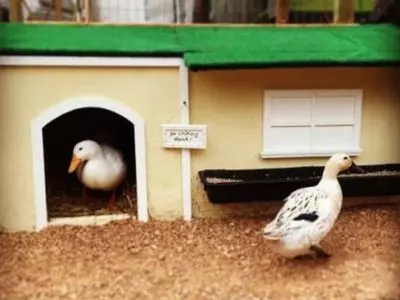No products in the cart.
Ducks
How to Keep Duck Bedding Dry – BEST Methods
Because of the potential for sickness, the presence of insects, and the overall discomfort that comes with sleeping on wet bedding, you should do everything you can to keep your ducks as dry as possible. Since ducks spend so much time near water, it’s only natural that they would bring some of that moisture with them when they settle down for the night. So let’s get into how to keep duck bedding dry and safe for your ducks to be in.
*This post may have affiliate links, which means I may receive commissions if you choose to purchase through links I provide (at no extra cost to you). As an Amazon Associate I earn from qualifying purchases. Please read my disclaimer for additional details.
How to Keep Duck Bedding Dry

Reasons For Wet Bedding

Tracking Water
Because ducks spend their time swimming and diving underwater, it’s very common for ducks to track water into their bedding. However, you want to make sure that the water being tracked in isn’t excessive and that it’s solely from the ducks, and that there’s no leaking or running water nearby. The water shouldn’t be to the point where it’s constantly soaking your duck’s bedding.A Hutch Opening
There could be holes, cracks, or other areas that allow for water to seep into their bed. Whether this is from the ground, the sky, or other areas of water, it’s important to either move their home to a new spot or try to resolve the water issue. Read More: What Does it Mean When a Duck Shakes? Shivering could be a sign of disease caused by wet bedding. Learn more.Rainwater
Ducks should always have a covered place to sleep, even if they’re free-range ducks. This helps to protect them from the elements and predators. If your duck’s nesting place isn’t adequately covered from all sides, this could be the culprit for wet bedding. Read More: How to Keep a Duck Pond Clean Naturally. Bedding isn’t the only thing you should keep clean. Learn more!Ways to Keep Duck Bedding Dry

Fixed Water Bowl
Ducks can’t go long without water, which is why most duck owners put a water bowl in the nesting area. That said, spilled water bowls can definitely lead to soggy bedding. Securing your duck’s water and food bowls to the inside of the shed or coop can prevent the ducks from tipping them over. Alternatively, you can use heavy water bowls that ducks are unable to tip over.Use Absorbent Mats
You can also surround the coop with some high-quality absorbent mats so that the majority of the water that the ducks carry will be soaked up by the mats rather than the coop. Since ducks’ feet and feathers pick up water, this won’t completely solve the issue of somewhat wet bedding but it will help to extend the life of your duck’s bedding.Change Bedding Regularly
Changing the bedding out regularly is a top way of keeping their nesting place dry. Replacing the straw or woodchips with dry bedding daily, or as needed, can make for a safe and comfortable environment for your ducks. Take out any bedding that has become wet or covered in droppings, and replace it with some that are clean and dry. If you wait several weeks or months to replace old bedding with new ones, you could be facing many problems such as smell, mold, and even sickness. Here’s a video showing how to change and dry brooder bedding:Move Duck Pen
Sometimes either the ducks are bringing water from a nearby source, or it might just be best to move the duck pen away from a water-attractive place. If you find that your ducks are having super wet bedding without the sign of a source, then it might be worth it to try moving the pen to see if it still continues. Read More: Why is My Duck Losing its Feathers? It’s normal for ducks to lose feathers at certain times of the year, but here are some warning signs.Downsides of Wet Bedding
If duck pens have chronically wet bedding it can cause a lot of different problems such as:- The spread of disease
- Attracting insects and pests
- A bad odor
- Mold or mildew
- Dirt or mud build-up

